

Randonnée : les syndicats craignent la disparition des cartes en papier. Les cartes imprimées de l’Institut national de l’information géographique et forestière (IGN) pourraient-elles disparaître ?
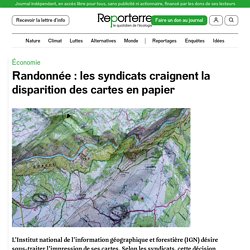
C’est ce que craignent les syndicats CGT de l’établissement public d’information géographique, après que la direction a annoncé vouloir fermer son imprimerie. À compter de 2023, ces cartes, bien connues des randonneurs et des amoureux de la géographie, ne devraient plus être imprimées que par des sous-traitants. Un changement qui risque, à long terme, d’entraîner une disparition pure et simple du format papier au profit du numérique, selon les syndicats. 21 nov. 2020 Se sentir appartenir à la nature ( Première partie ) Le confinement dans les maisons ou appartements permettra peut-être de s’interroger sur ce que vivent les enfants qui sont confinés, dès leur plus jeune âge dans notre pays , assis, pendant une grande partie de leurs journées d’école, à 30, dans des salles de 60 m2 ….
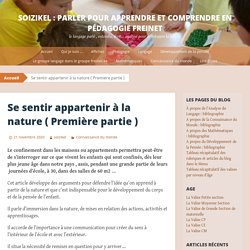
Cet article développe des arguments pour défendre l’idée qu’on apprend à partir de la nature et que c’est indispensable pour le développement du corps et de la pensée de l’enfant. Il parle d’immersion dans la nature, de mises en relation des actions, activités et apprentissages. Randos, marches, treks. Passer 2 heures chaque semaine dans la nature, un atout bien-être. Pourquoi c’est important Différentes études suggèrent que le temps passé en extérieur, au contact avec un environnement naturel, est bon pour la santé physique et mentale.
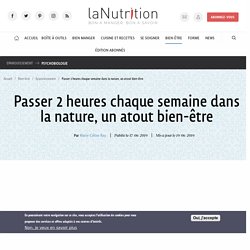
Doctors Are Finally Prescribing Nature For Chronic Disease. Think about how you feel after spending the day outside.

Tired, maybe, but also deeply satisfied. Our relationship to nature is primal—we thrive on it. Spending time in green spaces is absolutely crucial to human wellness. Luckily, doctors are finally starting to realize how powerful nature can be—especially when it comes to those with chronic health issues. Yep, they’re even prescribing it. 5-ways-spending-time-in-nature-benefits-your-brain. How Many Steps Should You Walk Daily For A Healthy Brain. Most people think that memory problems and cognitive impairment are just a couple of the things we can look forward to as we age.
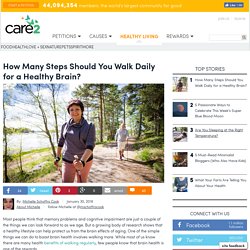
But a growing body of research shows that a healthy lifestyle can help protect us from the brain effects of aging. One of the simple things we can do to boost brain health involves walking more. While most of us know there are many health benefits of walking regularly, few people know that brain health is one of the rewards. Researchers at the Semel Institute for Neuroscience and Human Behavior at the University of California set to work to determine how much exercise in the form of walking we need to help maintain a healthy brain.
Published in the Journal of Alzheimer’s Disease, the researchers explored exactly how much exercise we need to reap the brain health benefits of walking. It’s not surprising that walking fuels our brain. So how can you benefit from the research? Easy Ways to Walk More. Outdoor-lessons-improve-childrens-learning. 5 Hacks For Getting Outside This Winter (Without Getting Cold) What’s the one thing that stops most of us from getting outside in the winter?

The COLD! I know I go stir-crazy if I am inside for months on end, so staying inside during the winter is a no-go. But what to do about the cold? How can we combat that bitter nip of cold that bites so unpleasantly at our noses (and everywhere else)? Whether you are just shuffling down the street or going out into nature for the entire day, here are 5 hacks to make your winter outdoor experience a lot more palatable: Learn how to layer First rule: avoid cotton. Tiques : 6 choses à savoir pour bien s’en protéger. Why A Walk In The Woods Is Vital For Your Health: The Science Behind Forest Bathing. Forest bathing is a concept originally developed in Japan in the 1980s.
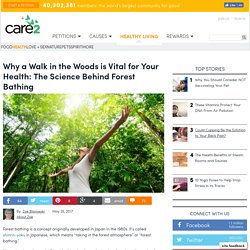
It’s called shinrin-yoku in Japanese, which means “taking in the forest atmosphere” or “forest bathing.” It’s as simple as it sounds. Forest bathing involves relaxing in a forest or other natural area, often taking a slow walk while observing the environment around you. It has become such a respected practice in Japan and Korea that forest therapy is now covered under their medical insurance systems. The healing power of nature has been known for millennia, but modern science is just discovering the importance of this ancient knowledge. The Health Benefits of Forest Bathing 1. A Japanese study looked at the physiological effects of forest bathing. In addition, these benefits were found after participants went forest bathing only once.
13 Amazing Benefits of Walking. You don’t need to train for a marathon, spend hours on an elliptical, or turn your guest room into a gym to get fitter, healthier and happier.
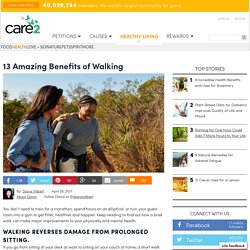
Keep reading to find out how a brisk walk can make major improvements to your physically and mental health. Walking reverses damage from prolonged sitting. If you go from sitting at your desk at work to sitting on your couch at home, a short walk could mean some big health benefits. 4 Ways to Celebrate the Solstice. The winter solstice, the shortest day and longest night of the year in the northern hemisphere and the official beginning of winter, has had deep spiritual significance since neolithic times.
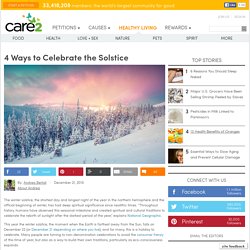
“Throughout history, humans have observed this seasonal milestone and created spiritual and cultural traditions to celebrate the rebirth of sunlight after the darkest period of the year,” explains National Geographic. This year the winter solstice, the moment when the Earth is farthest away from the Sun, falls on December 22 (or December 21 depending on where you live), and for many, this is a holiday to celebrate. Many people are turning to non-denomination celebrations to avoid the consumer frenzy of this time of year, but also as a way to build their own traditions, particularly as eco-consciousness expands. But why is it important to celebrate this event? According to Deena Wade of Mother Earth Living, Love This? 1. This idea comes to us from Richard Heinberg, author of Celebrate the Solstice.
A Little Bit of Nature Goes A Long Way. Everyone knows that spending time in the greater outdoors is good for your mental and physical health, so long as you slather on SPF 30.
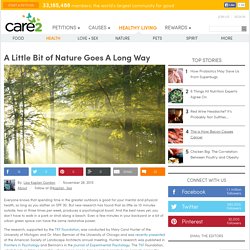
But new research has found that as little as 10 minutes outside, two or three times per week, produces a psychological boost. And the best news yet, you don’t have to walk in a park or stroll along a beach. Even a few minutes in your backyard or a bit of urban green space can have the same restorative power. Marcher dans la nature, c'est comme prendre des vitamines. Les activités en pleine nature sont favorables à la santé grâce à leur action positive sur le système immunitaire. Marcher en forêt, admirer le coucher de soleil sur la mer ou profiter de la quiétude d'une prairie... Toutes ces activités auraient un impact positif sur la santé. D'après une chercheuse de l'université de l'Illinois, Ming Kuo, qui publie un article sur l'influence des activités en plein air sur la santé, Dame Nature agirait sur l'organisme par le biais du système immunitaire. Le fait de passer du temps en pleine nature protégerait de différentes pathologies : dépression, diabète, obésité, maladies cardiovasculaires...
3 Incredible Reasons You Should Walk More. With our go-go-go lives, it can be easy to get wrapped up in the world of smart phones, fast transportation, and instant gratification. And many people follow the go-big-or-go-home attitude in their exercise philosophy alongside all of this technologic stress. This means that, for many, gentle walking and spending time with your thoughts falls by the wayside. But walking is equally important for your mind and body — just as much as your CrossFit or yoga class. Just one week without artificial lights can magically make you a morning person. Eight lucky people out in Colorado got to be part of the best scientific study ever.
It involved, basically, going camping and sleeping. And that was about it. And, at the end of it, they were all sleeping better. The key, Smithsonian reports, was that they had no artificial light sources: Moins d'enfants hyperactifs au soleil. La fréquence des troubles de l’attention avec hyperactivité est moins élevée dans les régions ensoleillées. Les enfants hyperactifs sont plus nombreux dans les régions recevant moins de lumière du soleil. C’est ce que montre une étude publiée dans Biological Psychiatry.
Le déficit de l’attention avec hyperactivité est le désordre psychiatrique le plus courant chez les enfants. Les enfants sont de moins en moins endurants. Les enfants sont moins endurants qu’il y a trente ans : ils ont des capacités inférieures de 15% à celles de leurs parents au même âge. Selon une étude australienne présentée le 19 novembre aux sessions scientifiques 2013 de l'American Heart Association, à Dallas. L'équipe de Grant Tomkinson, de l'université d'Australie-Méridionale, a analysé 50 études menées entre 1964 et 2010, évaluant l'endurance de plus de 25 millions d'enfants âgés de 9 à 17 ans dans 28 pays. Un réseau d'élèves qui fait avancer la science.
Marcher 8 h par semaine réduirait d'un tiers le risque d'AVC. Randonnée en Midi-pyrénées - Comité Régional de la Randonnée Pédestre - FFRandonnée. Voie verte Foix-St Girons.